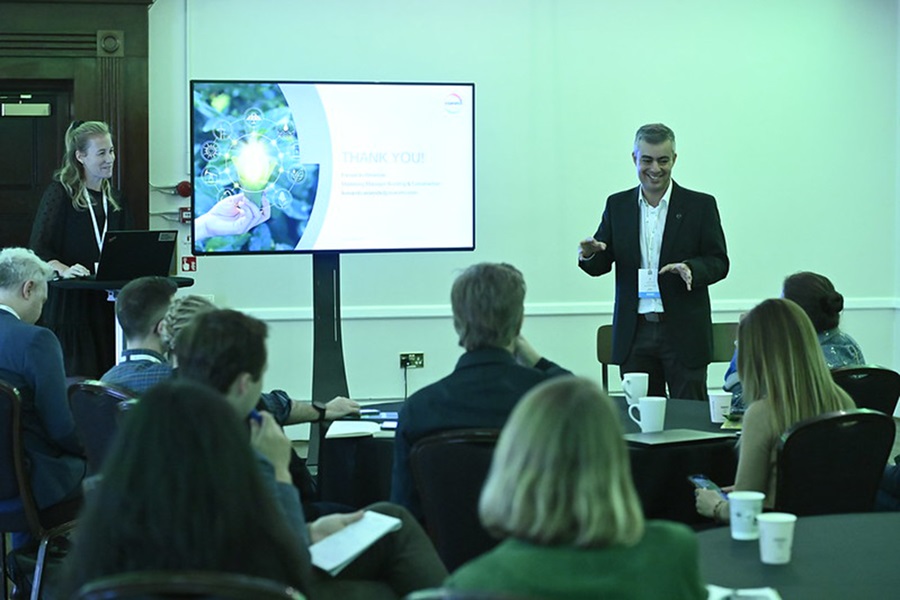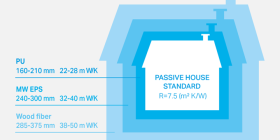
Exploring the path from materials to low carbon buildings
Collaborating for a sustainable future: Bringing industry leaders together to drive meaningful change
The construction industry is a significant contributor to global carbon emissions, with buildings accounting for a substantial portion of the world's energy consumption and carbon footprint. As we strive towards a more sustainable future, addressing the embodied carbon in construction materials and processes has become a critical challenge.
Embodied carbon refers to the greenhouse gas emissions associated with the extraction, manufacturing, transportation, and installation of building materials. According to the World Green Building Council, it is estimated that embodied carbon can account for up to 50% of a building's total carbon footprint over its lifetime between now and 2050. Reducing this embodied carbon is crucial in achieving net-zero emissions targets and mitigating the impact of the construction industry on climate change.
However, the path to low-carbon construction is complex, involving various stakeholders, materials, and processes. It requires a holistic approach that considers the entire lifecycle of buildings, from design and material selection to construction, operation, and eventual demolition or repurposing.
As a leading player in the materials sector, we are committed to driving the shift towards sustainable construction practices. The workshop brought together architects, designers, and sustainability experts to explore how the architectural industry can achieve net-zero embodied carbon over the next decade. We discussed key challenges, opportunities, and potential solutions that can help us reach our shared sustainability goals.

The need for change: Reducing embodied carbon
It became clear that reducing embodied carbon requires a more comprehensive and unified approach across the construction industry.
97% of European building stock is currently not efficient enough to meet future carbon reduction targets.
Participants acknowledged that while architects can drive sustainable building solutions, the current design and procurement processes often lack the flexibility needed to support circularity. A major takeaway was that more collaborative efforts and a shift in mindset are essential to enable the reuse and recycling of materials, moving us closer to our net-zero goals.
AI's role in supporting low-carbon design
Another significant theme was the potential role of AI in facilitating low-carbon material choices and design processes. One promising solution discussed was the use of AI-powered material databases and lifecycle analysis tools, which could help architects and designers quickly evaluate the environmental impact of different material choices during the design phase.
Participants explored how AI could be leveraged to optimize building designs for circularity, by analyzing material properties, identifying opportunities for reuse or recycling, and minimizing waste throughout the construction process.
The consensus was that AI could be a valuable tool for analyzing complex data and making sustainable decisions more manageable, but there was a reminder of the importance of using technology as a supportive, rather than a replacement, tool in our quest for sustainable solutions.
Moving towards a climate-neutral future
Workshop attendees also discussed how a combination of education, legislation, and industry-wide collaboration is crucial for accelerating the adoption of low-carbon materials and practices.
A system change needs to happen to enable the re-use of materials.
Experts emphasized the need for a comprehensive policy framework that incentivizes the use of low-carbon materials and promotes circular building practices, such as material passports and deconstruction protocols. Education and upskilling were identified as critical components in driving the transition towards climate-neutral construction, with calls for incorporating sustainable design principles and material knowledge into architectural curricula.
Embodied carbon needs a big rebrand. It needs proper messaging.
The need for a "system change" was emphasized to create a future where reusing materials is the norm rather than the exception. Achieving climate-neutral construction is a challenging journey, but one we’re all ready to take together.
Collaboration plays a crucial role to pave the way
Our Eco-Innovators workshop reinforced the need for collaboration, innovation, and systemic change if we are to achieve truly climate-neutral buildings. The workshop highlighted successful collaborative initiatives like the 'Low Carbon Corridor' project, where material suppliers, architects, and contractors worked together to reduce the embodied carbon of a commercial building by over 30%. Participants stressed the importance of fostering cross-industry partnerships and knowledge-sharing platforms, where best practices, innovative solutions, and lessons learned can be disseminated across the construction value chain. By working together, we can drive the transition to low-carbon, circular building practices and help shape a more sustainable future for the construction industry.
Key benefits
- Low embodied carbon: Desmodur® CQ MS enables more sustainable PU insulation with a lower carbon footprint.
- Renewable content: Bio-circular content is attributed via the mass balance approach certified by ISCC PLUS.
- High performance: Desmodur® CQ MS keeps the same thermal insulation performance of polyurethane.
- Resource saving: PUR/PIR insulation boards use up 100x less energy during their manufacturing process than they help to save during their lifecycle.
- Strong and durable: Rigid foam is low-maintenance and resists weather, chemicals and UV light.













